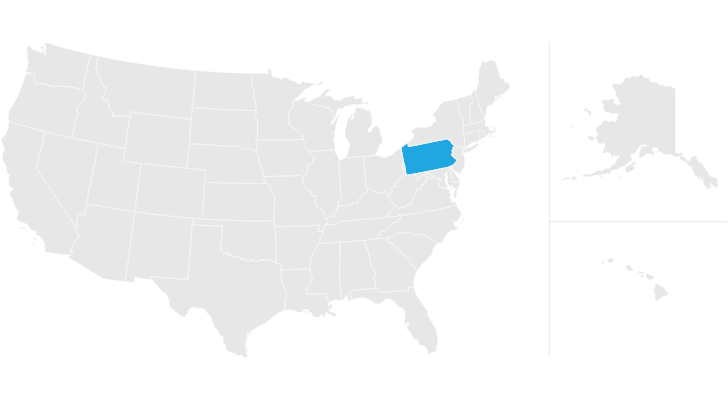Pennsylvania does not have an estate tax. No matter the size of the estate, it will owe nothing to the state of Pennsylvania before the money is dispersed to heirs. There is a federal estate tax that may apply, and Pennsylvania does have an inheritance tax. If you think you might need help with estate planning or financial planning more generally, SmartAsset’s free financial advisor matching tool can help you find an advisor who serves your area.
Pennsylvania Estate Tax
Pennsylvania is one of 17 states (and the District of Columbia) that has an additional estate or inheritance tax on top of the federal estate tax.
What Is the Estate Tax?
The estate tax is charged on the estate of a recently deceased person. The money is taken after the person has died but before the money is dispersed to their heirs. It is sometimes called the “death tax.”
The estate tax is different from the inheritance tax. Inheritance taxes are taken from a person’s heirs after the inheritance has already been passed on.
Pennsylvania Inheritance Tax and Gift Tax

Though there is no estate tax, there is an inheritance tax in Pennsylvania. The percentage paid depends on the relationship between the heir and the decedent.
No tax is applied on transfers to a surviving spouse or to a parent from a child under the age of 21. There is a 4.5% tax applied to transfers to direct descendants and other lineal heirs like grandchildren. There is a 12% tax on transfers to siblings and a 15% tax on transfers to any other heir, with the exception of charitable organizations, exempt institutions and government entities that don’t pay tax.
The Pennsylvania estate tax is owed by out-of-state heirs for real property and tangible personal property located in the Keystone State.
There is no gift tax in Pennsylvania. The federal gift tax has an exemption of $19,000 per recipient for 2026. A gift worth more than this to one person in a year counts against your 2026 lifetime exemption of $15 million.
Federal Estate Tax
No estate will have to pay estate tax from Pennsylvania. There is still a federal estate tax. The federal estate tax exemption is $15 million in 2026 and $13.99 million in 2025. This exemption is portable. This means that with the right legal maneuvering a married couple can protect up to $30 million after both spouses have died.
If an estate exceeds that amount, the top tax rate is 40%. A full chart of federal estate tax rates is below.
Here’s how it works. Let’s say your estate is worth $25 million and you aren’t married. Subtracting the 2026 exemption of $15 million, creates a taxable estate of $10 million. Consulting the chart, you are in the top bracket. The base tax payment on the first $1 million is $345,800. The top rate of 40% applies to the remaining $9 million, which comes to $3.6 million. That sum is added to the base taxes of $345,800, meaning the total federal estate tax burden is $3,945,800.
Federal Estate Tax Rates
| Taxable Estate* | Base Taxes Paid | Marginal Rate | Rate Threshold** |
| $1 – $10,000 | $0 | 18% | $1 |
| $10,000 – $20,000 | $1,800 | 20% | $10,000 |
| $20,000 – $40,000 | $3,800 | 22% | $20,000 |
| $40,000 – $60,000 | $8,200 | 24% | $40,000 |
| $60,000 – $80,000 | $13,000 | 26% | $60,000 |
| $80,000 – $100,000 | $18,200 | 28% | $80,000 |
| $100,000 – $150,000 | $23,800 | 30% | $100,000 |
| $150,000 – $250,000 | $38,800 | 32% | $150,000 |
| $250,000 – $500,000 | $70,800 | 34% | $250,000 |
| $500,000 – $750,000 | $155,800 | 37% | $500,000 |
| $750,000 – $1,000,000 | $248,300 | 39% | $750,000 |
| Over $1,000,000 | $345,800 | 40% | $1,000,000 |
*The taxable estate is the total above the 2026 exemption of $15 million.
**The rate threshold is the point at which the marginal estate tax rate kicks in.
Overall Pennsylvania Tax Picture

Pennsylvania is a tax-friendly state for retirees. Social Security is not taxed, and neither are pensions or withdrawals from retirement accounts. Pennsylvania’s income tax rate is a flat rate of 3.07%, but there are also some local income taxes. The average effective property tax rates in Pennsylvania is 1.16%, which is fairly high. You can use this Pennsylvania paycheck calculator to calculate what your take home pay will be.
The sales tax in the Keystone State is 6% across the state with two exceptions. There is an additional 1% sales tax charged in Allegheny County (including Pittsburgh) for a total of 7% and a 2% surcharge in Philadelphia for a total sales tax of 8%.
Additional Estate Planning Items to Consider
Even though Pennsylvania does not have a state-level estate tax, estate planning remains relevant, particularly because of the state’s inheritance tax and the potential for federal estate tax liability. Individuals may want to consider the structure of their assets, especially real estate and tangible property located in Pennsylvania, which are subject to inheritance tax even for out-of-state heirs.
Trusts, lifetime gifting strategies and beneficiary designations may play a role in managing inheritance tax exposure. It is also important to consider how jointly held property, retirement accounts, and life insurance policies pass outside of probate, and how those transfers may be treated under state inheritance tax law.
Planning documents commonly used include:
- Will: A will directs how your assets should be distributed after death and can designate guardians for minor children.
- Power of attorney: A power of attorney allows someone to manage your financial or legal affairs if you become incapacitated.
- Healthcare directive: A healthcare directive records your medical treatment preferences and names someone to make healthcare decisions if you cannot communicate them yourself.
- Revocable or irrevocable trust: A trust allows you to control how assets are distributed, may avoid probate, and can help reduce certain tax obligations depending on how it is structured.
Estate Planning Tips
- Planning your estate takes a lot of time and requires strict attention to detail. Finding a financial advisor who can help doesn’t have to be hard. SmartAsset’s free tool matches you with vetted financial advisors who serve your area, and you can have a free introductory call with your advisor matches to decide which one you feel is right for you. If you’re ready to find an advisor who can help you achieve your financial goals, get started now.
- One common mistake when writing a will is to overlook state-specific rules. Each state has its own rules for will writing, so talk with your advisor and check local laws to make sure you’re in the clear.
Photo credit: ©iStock.com/Drazen_, SmartAsset, ©iStock.com/Ultima_Gaina
